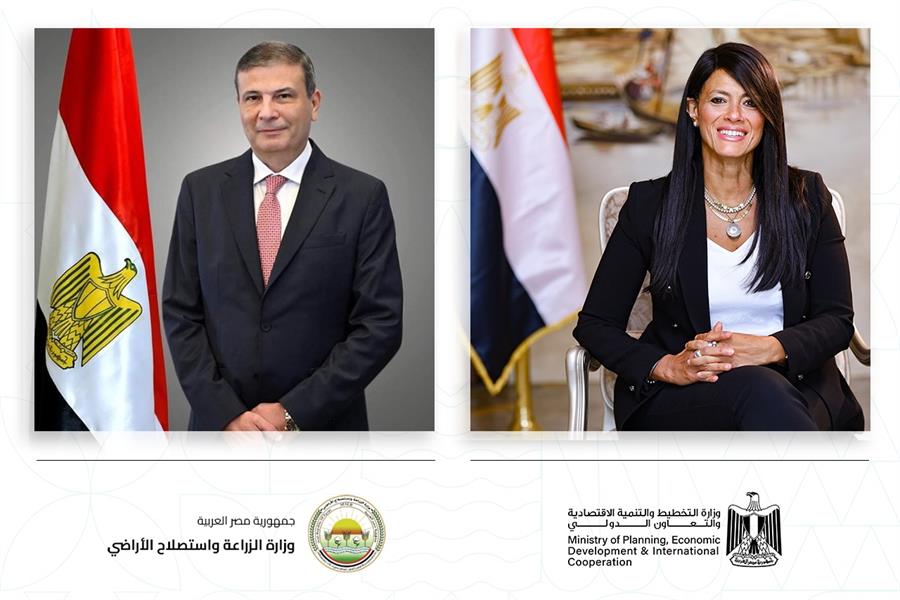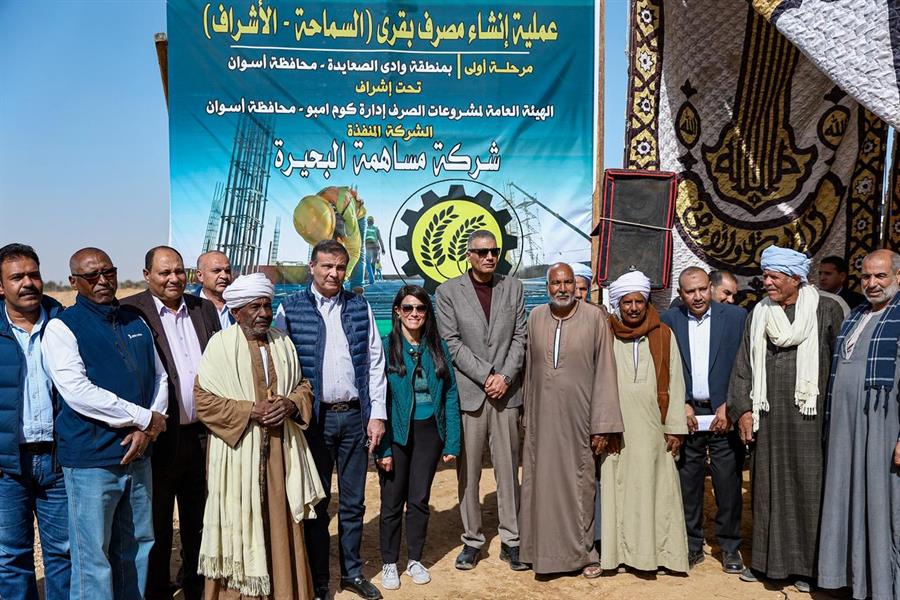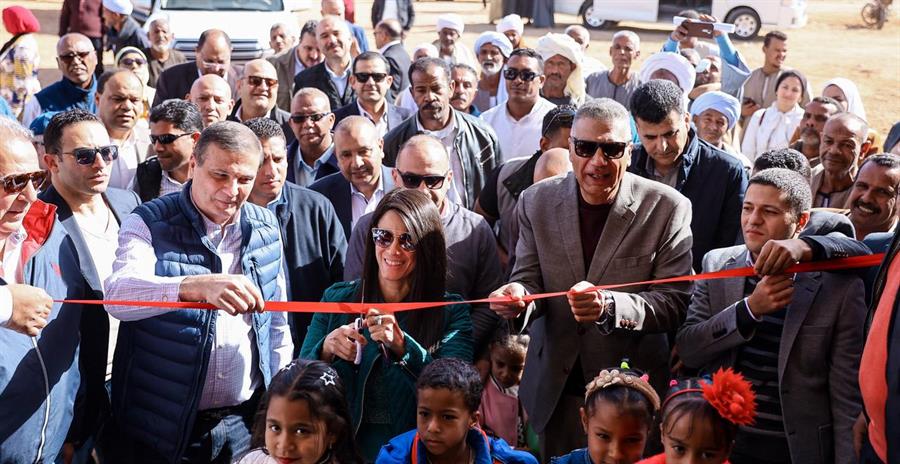Minister of Planning, Economic Development, and International Cooperation and the French Ambassador reaffirm continued coordination to implement the strategic partnership pillars between the two countries.
02 October 2025
Dr. Rania Al-Mashat and the French Ambassador to Cairo responding to media questions during the joint press conference announcing the renewal of the technical and financial cooperation agreement between Egypt and France.
Minister of Planning, Economic Development, and International Cooperation and the French Ambassador reaffirm continued coordination to implement the strategic partnership pillars between the two countries.
Dr. Rania Al-Mashat: Development cooperation is a major pillar in a broader relationship between Egypt and France based on common interests, strengthening trade and investment ties, and advancing industrial localization.
Economic performance in the past fiscal year indicates a structural shift in growth components, driven by real economy sectors.
We are keen to maximize the use of diverse financing sources in line with public investment governance efforts to create more space for the private sector.
Financing for development is a common denominator across various strategies, opening the way to attract private sector investments.
French Ambassador: We reaffirm our commitment to advancing joint cooperation with Egypt across multiple fields.
Egypt possesses tremendous human capital, and France supports priority government projects such as universal health insurance.
H.E. Dr. Rania Al-Mashat, Minister of Planning, Economic
Development, and International Cooperation, underscored the ongoing
coordination and joint work with the French Ambassador to implement the
strategic partnership pillars between the two countries.
This came during the joint press conference held at the
Ministry’s headquarters in the New Administrative Capital, announcing the
renewal of the technical and financial cooperation agreement worth €4 billion
between Egypt and France until 2030.
The Minister highlighted the depth of the long-standing
partnership between the two countries, including development cooperation as one
of the pillars within a broader framework encompassing investment, trade, and
industrial localization. She noted that Egypt consistently works to foster an
attractive investment climate and expand private sector participation as a
fundamental driver of economic growth and job creation, in line with the
recently launched “Egypt’s Narrative for Economic Development: Reforms for
Growth, Jobs & Resilience.”
H.E. added that industrial localization is one of the key
pillars of the Egypt–France partnership, consistent with the third chapter of
Egypt’s Narrative for Economic Development. Through this, the state seeks to
encourage manufacturing, expand the use of local products, and increase added
value, while leveraging the comparative advantages of each development partner
to meet national priorities.
The Minister further pointed out that renewable energy is a
main pillar of cooperation between Egypt and France, in line with government
efforts to raise the share of renewable energy in the energy mix. In this
regard, Egypt’s “NWFE” country platform
— a model of country platforms — is a cornerstone of Egypt–France cooperation
in sustainable infrastructure. The partnership also extends to major projects
such as the Cairo Metro, which serves approximately 4 million citizens daily.
H.E. recalled the historic visit of H.E. President Emmanuel
Macron to Egypt last April, which carried important political, economic, and
cultural dimensions. During that visit, a memorandum of understanding was
signed with the French Minister of Economy, translated into €4 billion in
financial commitments, €3.2 billion from
the French government and €800 million from the French Development Agency
(AFD). These funds target development projects in Egypt's priority sectors,
including human development in health, education, and technical education, as
well as sustainable infrastructure projects that support the transition to a
green economy, renewable energy projects, NWFE-linked initiatives, and private
sector financing.
Dr. Al-Mashat emphasized that the launch of Egypt’s
Narrative for Economic Development reaffirms the government’s determination to
transition toward a new economic model that emphasizes higher productivity
sectors and those with strong export potential. She noted that this transition
is underpinned by advanced infrastructure, which supports both manufacturing
and investment, while redefining the role of the state to enhance
competitiveness and stimulate private sector participation.
She added that the narrative sets clear targets to 2030,
stressing that the real significance lies not only in the numbers but in the
composition of growth. The state aims to strengthen real economy sectors’
contribution to growth, already evident
in last year’s 4.4% GDP growth, supported by non-petroleum manufacturing,
agriculture, ICT, and tourism.
H.E. further reaffirmed that through Egypt’s Integrated
National Financing Strategy (E-INFS), launched last year, the government is
enhancing economic diplomacy to advance financing for development. This ensures
consistency between national and sectoral strategies and maximizes the benefits
of different financing sources, from the
public treasury to concessional financing flows, in service of state strategies
and programs. She stressed that financing for development is a common
denominator across various strategies and is key to attracting private sector
investment.
For his part, the French Ambassador in Cairo affirmed that
human capital is one of the most important elements of development, noting
Egypt’s large youth population and significant human potential. He emphasized
that France supports several sectors through bilateral cooperation, including
Egypt’s universal health insurance system.
He further underscored that France, along with the
international community, recognizes Egypt as a cornerstone of regional
stability, making cooperation between both countries even more significant in the
coming period. He highlighted that the Egypt–France partnership is aligned with
Egypt’s Narrative for Economic Development and the NWFE program, which provide
a model for renewed cooperation in addressing climate challenges, alongside
shared priorities such as infrastructure, women’s empowerment, and sustainable
development.
In response to media questions, the Ambassador explained that France does not impose projects on the Egyptian side but responds to the government’s priorities and development needs. He also pointed to French private sector investments in Egypt, which provide tens of thousands of jobs and reflect the growing depth of relations. He concluded by stressing that climate change is a global challenge, and France is committed to cooperating closely with Egypt through both technical support and financing for climate-related projects.









